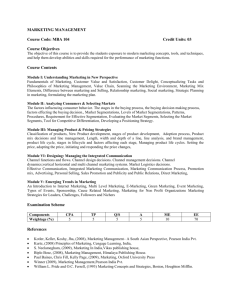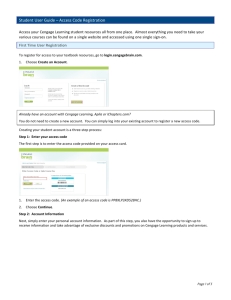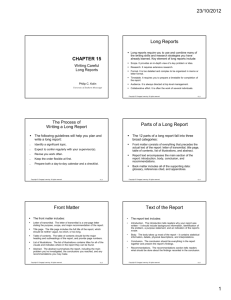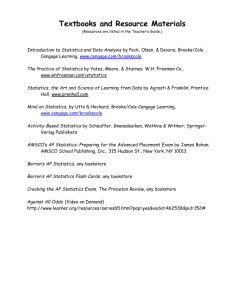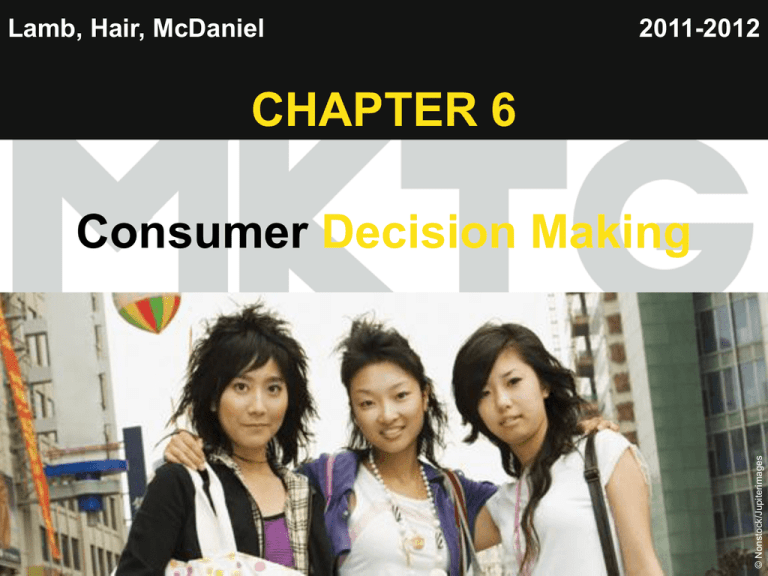
Lamb, Hair, McDaniel
2011-2012
CHAPTER 6
Chapter 6
Copyright ©2012 by Cengage Learning Inc. All rights reserved
1
© Nonstock/Jupiterimages
Consumer Decision Making
Learning Outcomes
LO 1 Explain why marketing managers should understand
consumer behavior
LO 2 Analyze the components of the consumer decisionmaking process
LO 3 Explain the consumer’s postpurchase evaluation
process
LO 4 Identify the types of consumer buying decisions and
discuss the significance of consumer involvement
Chapter 6
Copyright ©2012 by Cengage Learning Inc. All rights reserved
2
Learning Outcomes
LO 5 Identify and understand the cultural factors that affect
consumer buying decisions
LO 6 Identify and understand the social factors that affect
consumer buying decisions
LO 7 Identify and understand the individual factors that affect
consumer buying decisions
LO 8 Identify and understand the psychological factors that
affect consumer buying decisions
Chapter 6
Copyright ©2012 by Cengage Learning Inc. All rights reserved
3
The Importance of Understanding
Consumer Behavior
Explain why
marketing managers
should understand
consumer behavior
LO1
Chapter 6
Copyright ©2012 by Cengage Learning Inc. All rights reserved
4
Understanding Consumer
Behavior
consumers make
purchase decisions
Consumer
behavior
= HOW
consumers use and
dispose of product
LO1
Chapter 6
Copyright ©2012 by Cengage Learning Inc. All rights reserved
5
The Consumer
Decision-Making Process
Analyze the
components
of the consumer
decision-making
process
LO2
Chapter 6
Copyright ©2012 by Cengage Learning Inc. All rights reserved
6
Consumer
Decision-Making Process
Consumer
Decision-Making
Process
A five-step process used
by consumers when
buying goods or services.
LO2
Chapter 6
Copyright ©2012 by Cengage Learning Inc. All rights reserved
7
Exhibit 6.1
Consumer DecisionMaking Process
LO2
Chapter 6
Copyright ©2012 by Cengage Learning Inc. All rights reserved
8
Need Recognition
Need
Recognition
Result of an imbalance between
actual and desired states.
LO2
Chapter 6
Copyright ©2012 by Cengage Learning Inc. All rights reserved
9
Beyond the Book
Consumers Scale Back
• A Pew Research Center poll suggests
consumers are more focused on basic
necessities.
• 63 percent of women and 51 percent of men
report buying cheaper brands and increased
shopping at discount stores.
• An increased number of respondents
reported internet as a necessity, while a
decreased number reported television.
Source: Dick Silverman."Luxury and Necessity: Redefining Values." WWD. Wednesday, June 10, 2009. 8.
Chapter 6
Copyright ©2012 by Cengage Learning Inc. All rights reserved
10
Need Recognition
Present
Status
Preferred
State
Marketing helps consumers recognize
an imbalance between present status
and preferred state.
LO2
Chapter 6
Copyright ©2012 by Cengage Learning Inc. All rights reserved
11
Stimulus
Stimulus
Any unit of input affecting
one or more of the five senses:
•sight
•smell
•taste
•touch
•hearing
LO2
Chapter 6
Copyright ©2012 by Cengage Learning Inc. All rights reserved
12
Recognition of
Unfulfilled Wants
• When a current product isn’t performing
properly
• When the consumer is running out of a
product
• When another product seems superior to
the one currently used
LO2
Chapter 6
Copyright ©2012 by Cengage Learning Inc. All rights reserved
13
Information Search
Internal Information Search
•
Recall information in memory
External Information search
•
Seek information in outside environment
•
•
Nonmarketing controlled
Marketing controlled
LO2
Chapter 6
Copyright ©2012 by Cengage Learning Inc. All rights reserved
14
External
Information Searches
Need Less
Information
Less Risk
More knowledge
More product experience
Low level of interest
Confidence in decision
Need More
Information
More Risk
Less knowledge
Less product experience
High level of interest
Lack of confidence
LO2
Chapter 6
Copyright ©2012 by Cengage Learning Inc. All rights reserved
15
Evoked Set
Evoked Set
Group of brands, resulting from an
information search, from which a
buyer can choose
LO2
Chapter 6
Copyright ©2012 by Cengage Learning Inc. All rights reserved
16
Evaluation of Alternatives
and Purchase
Evoked Set
Analyze product
attributes
Use cutoff criteria
Rank attributes by
importance
LO2
Chapter 6
Purchase!
Copyright ©2012 by Cengage Learning Inc. All rights reserved
17
Purchase
To buy
or not to buy...
Determines which attributes
are most important
in influencing a
consumer’s choice
LO2
Chapter 6
Copyright ©2012 by Cengage Learning Inc. All rights reserved
18
Postpurchase Behavior
Explain the consumer’s
postpurchase
evaluation process
LO3
Chapter 6
Copyright ©2012 by Cengage Learning Inc. All rights reserved
19
Cognitive Dissonance
Cognitive
Dissonance
Inner tension that a
consumer experiences
after recognizing an
inconsistency between
behavior and values or
opinions.
LO3
Chapter 6
Copyright ©2012 by Cengage Learning Inc. All rights reserved
20
Postpurchase Behavior
Consumers can reduce dissonance by:
Seeking information that reinforces positive
ideas about the purchase
Avoiding information that contradicts the
purchase decision
Revoking the original decision by returning
the product
Marketing can minimize dissonance through effective
communication with purchasers.
LO3
Chapter 6
Copyright ©2012 by Cengage Learning Inc. All rights reserved
21
Types of Consumer Buying Decisions
and Consumer Involvement
Identify the types of
consumer buying
decisions and discuss
the significance of
consumer involvement
LO4
Chapter 6
Copyright ©2012 by Cengage Learning Inc. All rights reserved
22
Consumer Buying Decisions
and Consumer Involvement
Routine
Response
Behavior
Limited
Decision
Making
Extensive
Decision
Making
Less
Involvement
More
Involvement
LO4
Chapter 6
Copyright ©2012 by Cengage Learning Inc. All rights reserved
23
Involvement
Involvement is…
the amount of time and effort a buyer invests in the
search, evaluation, and decision processes of
consumer behavior.
LO4
Chapter 6
Copyright ©2012 by Cengage Learning Inc. All rights reserved
24
Exhibit 6.2
Continuum of
Consumer Buying
Decisions
LO4
Chapter 6
Copyright ©2012 by Cengage Learning Inc. All rights reserved
25
Routine
Response Behavior
LO4
Chapter 6
Little involvement in selection
process
Frequently purchased low cost
goods
May stick with one brand
Buy first/evaluate later
Quick decision
Copyright ©2012 by Cengage Learning Inc. All rights reserved
26
Limited Decision Making
Low levels of involvement
Low to moderate cost goods
Evaluation of a few alternative
brands
Short to moderate time to
decide
LO4
Chapter 6
Copyright ©2012 by Cengage Learning Inc. All rights reserved
27
Extensive Decision Making
LO4
Chapter 6
High levels of involvement
High cost goods
Evaluation of many brands
Long time to decide
May experience cognitive
dissonance
Copyright ©2012 by Cengage Learning Inc. All rights reserved
28
Factors Determining the Level
of Consumer Involvement
Previous Experience
Interest
Perceived Risk of
Negative Consequences
Situation
Social Visibility
LO4
Chapter 6
Copyright ©2012 by Cengage Learning Inc. All rights reserved
29
Marketing Implications
of Involvement
High-involvement
purchases require:
Extensive and informative
promotion to target market
Low-involvement
purchases require:
In-store promotion,
eye-catching package
design, and good displays.
Coupons, cents-off,
2-for-1 offers
LO4
Chapter 6
Copyright ©2012 by Cengage Learning Inc. All rights reserved
30
Cultural Influences on
Consumer Buying Decisions
Identify and
understand the
cultural factors that
affect consumer
buying decisions
LO5
Chapter 6
Copyright ©2012 by Cengage Learning Inc. All rights reserved
31
Factors Influencing Buying
Decisions
Cultural
Factors
Individual
Factors
Social
Factors
Psychological
Factors
CONSUMER
DECISIONMAKING
PROCESS
BUY /
DON’T BUY
LO5
Chapter 6
Copyright ©2012 by Cengage Learning Inc. All rights reserved
32
Components of Culture
Values
Language
Myths
Customs
Rituals
Laws
LO5
Chapter 6
Material artifacts
Copyright ©2012 by Cengage Learning Inc. All rights reserved
33
Culture is. . .
Pervasive
Functional
Learned
Dynamic
LO5
Chapter 6
Copyright ©2012 by Cengage Learning Inc. All rights reserved
34
Value
Value
Enduring belief that a
specific mode of conduct
is personally or socially
preferable to another
mode of conduct.
LO5
Chapter 6
Copyright ©2012 by Cengage Learning Inc. All rights reserved
35
Understanding Cultural
Differences
• A firm has little chance of selling products in
a culture that it does not understand.
• Like people, products have cultural value.
In China
In U.S.
Color of
mourning
Brides wear
LO5
Chapter 6
Copyright ©2012 by Cengage Learning Inc. All rights reserved
36
Subculture
Subculture
A homogeneous group
of people who share
elements of the overall
culture as well as cultural
elements unique to their
own group.
LO5
Chapter 6
Copyright ©2012 by Cengage Learning Inc. All rights reserved
37
Social Class
Social Class
A group of people in a society
who are considered nearly
equal in status or community
esteem, who regularly
socialize among themselves
both formally and informally,
and who share behavioral
norms.
LO5
Chapter 6
Copyright ©2012 by Cengage Learning Inc. All rights reserved
38
LO5
Exhibit 6.4
U.S. Social Classes
SOURCE: Adapted from Richard P. Coleman, “The Continuing Significance of Social Class to Marketing,” Journal of Consumer Research, December 1983, 267; Dennis Gilbert and
Joseph A. Kahl, The American Class Structure: A Synthesis (Homewood, IL: Dorsey Press, 1982), ch. 11.
Chapter 6
Copyright ©2012 by Cengage Learning Inc. All rights reserved
39
Social Class
Measurements
Occupation
Income
Education
Wealth
LO5
Chapter 6
Other Variables
Copyright ©2012 by Cengage Learning Inc. All rights reserved
40
The Impact of
Social Class on Marketing
Indicates which medium to use for
advertising
Helps determine the best distribution for
products
LO5
Chapter 6
Copyright ©2012 by Cengage Learning Inc. All rights reserved
41
Social Influences on
Consumer Buying Decisions
Identify and
understand the
social factors that
affect consumer
buying decisions
LO6
Chapter 6
Copyright ©2012 by Cengage Learning Inc. All rights reserved
42
Social Influences
Reference
Groups
Opinion
Leaders
Family
Members
LO6
Chapter 6
Copyright ©2012 by Cengage Learning Inc. All rights reserved
43
Exhibit 6.5
Types of Reference Groups
LO6
Chapter 6
Copyright ©2012 by Cengage Learning Inc. All rights reserved
44
Influences of
Reference Groups
They serve as information sources and influence
perceptions.
They affect an individual’s aspiration levels.
Their norms either constrain or stimulate
consumer behavior.
LO6
Chapter 6
Copyright ©2012 by Cengage Learning Inc. All rights reserved
45
Opinion Leaders
Opinion Leaders
An individual who influences
the opinion of others.
LO6
Chapter 6
Copyright ©2012 by Cengage Learning Inc. All rights reserved
46
Opinion Leaders…
…are the first to try new products
and services out of pure curiosity.
…can be challenging to locate.
Marketers are increasingly using
blogs, social networking, and other
online media to determine and attract
opinion leaders.
LO6
Chapter 6
Copyright ©2012 by Cengage Learning Inc. All rights reserved
47
Family
Purchase Process Roles
in the Family
•
Initiators
•
Influencers
•
Decision Makers
•
Purchasers
•
Consumers
LO6
Chapter 6
Copyright ©2012 by Cengage Learning Inc. All rights reserved
48
Individual Influences on
Consumer Buying Decisions
Identify and
understand the
individual factors
that affect consumer
buying decisions
LO7
Chapter 6
Copyright ©2012 by Cengage Learning Inc. All rights reserved
49
Individual Influences
Gender
Age
Life Cycle
Personality
Self-Concept
Lifestyle
LO7
Chapter 6
Copyright ©2012 by Cengage Learning Inc. All rights reserved
50
Age and Family Life
Cycle Stage
• Consumer tastes in food, clothing, cars,
furniture, and recreation are often age
related.
• Marketers define target markets
according to life cycle stages such as
“young singles” or “young married with
children.”
LO7
Chapter 6
Copyright ©2012 by Cengage Learning Inc. All rights reserved
51
Personality, Self-Concept,
and Lifestyle
• Personality combines psychological
makeup and environmental forces.
• Human behavior depends largely on selfconcept.
• Self-concept combines ideal self-image
and real self-image.
LO7
Chapter 6
Copyright ©2012 by Cengage Learning Inc. All rights reserved
52
Psychological Influences on
Consumer Buying Decisions
Identify and
understand the
psychological
factors that affect
consumer buying
decisions
LO8
Chapter 6
Copyright ©2012 by Cengage Learning Inc. All rights reserved
53
Psychological Influences
Perception
Motivation
Learning
Beliefs & Attitudes
LO8
Chapter 6
Copyright ©2012 by Cengage Learning Inc. All rights reserved
54
Perception
Selective
Exposure
Consumer notices certain stimuli
and ignores others
Selective
Distortion
Consumer changes or distorts
information that conflicts
with feelings or beliefs
Selective
Retention
Consumer remembers only
that information that
supports personal beliefs
LO8
Chapter 6
Copyright ©2012 by Cengage Learning Inc. All rights reserved
55
Marketing Implications
of Perception
Important attributes
Price
Brand names
Quality and reliability
Threshold level of perception
Product or repositioning changes
Foreign consumer perception
Subliminal perception
LO8
Chapter 6
Copyright ©2012 by Cengage Learning Inc. All rights reserved
56
Motivation
Maslow’s
Hierarchy
of Needs
A method of classifying human
needs and motivations into five
categories in ascending order of
importance.
LO8
Chapter 6
Copyright ©2012 by Cengage Learning Inc. All rights reserved
57
Exhibit 6.6
Maslow’s Hierarchy
of Needs
LO8
Chapter 6
Copyright ©2012 by Cengage Learning Inc. All rights reserved
58
Types of Learning
Experiential
An experience changes
behavior
Conceptual
Not learned through direct
experience
LO8
Chapter 6
Copyright ©2012 by Cengage Learning Inc. All rights reserved
59
Beliefs and Attitudes
Belief
Attitude
An organized pattern of
knowledge that an individual
holds as true about his or her
world.
A learned tendency to respond
consistently toward a given
object.
LO8
Chapter 6
Copyright ©2012 by Cengage Learning Inc. All rights reserved
60
Changing Beliefs
•
Change beliefs about the brand’s attributes
•
Change the relative importance of these
beliefs
•
Add new beliefs
LO8
Chapter 6
Copyright ©2012 by Cengage Learning Inc. All rights reserved
61
Beyond the Book
Chapter 6 Videos
Chapter 6
ReadyMade – Consumer Decision
Making
How does the cover of ReadyMade magazine
reflect the principles of packaging design as
influenced by the known behaviors of its
consumers?
http://www.cengage.com/marketing/boo
k_content/1439039429_lamb/company_c
lips/ch06.html
Copyright ©2012 by Cengage Learning Inc. All rights reserved
62

